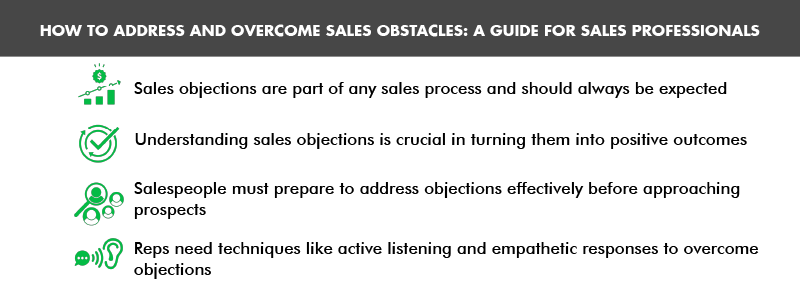How to Address and Overcome Sales Obstacles: A Guide for Sales Professionals

Sales objections can lead to lost revenue, reduced profit margins, and increased customer churn. Learn how to navigate and overcome these issues to reach new heights of sales success.

According to Zig Ziglar, every potential sale comes with five obstacles: no money, no need, no trust, no desire, and no hurry – the fundamental sales objections that salespeople wrestle with every day.
A sales objection is a concern or doubt a prospect uses to justify not buying your goods or services. For instance, a prospective buyer may turn down your product by claiming they hadn’t budgeted for it or already have something similar. For sales reps, such issues stand in the way of closing more deals.
Luckily, sales objections are not insurmountable. You can overcome them and increase your revenue. But to do that, you need to understand the causes behind these common sales objections and develop techniques for turning them into profitable opportunities.
Understanding sales objections
To fully understand why prospects won’t or can’t purchase your products or services, you first need to familiarize yourself with the most common types of sales objections:
- Price-related objections are concerns about a specific item’s cost or value.
- Product-related objections arise when prospects question the necessity or quality of your products or services.
- Competitor-related objections involve a prospect making unfavorable comparisons of your products or services with those of your competitors.
- Authority-related objections arise when prospects doubt your (or your company’s) credibility or authority.
- Time-related objections revolve around a prospect’s ability to purchase goods or services at a specific time.
Learning about common types of sales objections is the first step to understanding why your company faces sales hurdles. From here, you need to understand the reasons behind many of these objections.
Reasons for sales objections
According to surveys, 95% of people are more likely to buy goods or services from sales reps they trust. If a prospect doesn’t trust you as a salesperson, they will likely object to your offers. Prospects may also initially shy away from purchasing your products due to fear of change.
If prospects don’t express trust issues or fear change, and they still refuse to buy from you, they may not fully understand your product’s benefits, or they may doubt your authority.
For example, if a potential buyer repeatedly asks confusing questions or requests clarification, they probably don’t understand your goods or services well enough to consider purchasing them. On the other hand, prospects who doubt your authority are likely to question your credibility, compare you with your competitors, or seek second opinions.
In all of these cases, the best way to overcome obstacles and turn objections into conversions is to be prepared.
Preparation for overcoming sales objections
As a sales expert, you can avoid surprises and unexpected letdowns by preparing for sales objections and finding ways to overcome them in advance. Here is how to go about it.
1. Research your prospect
Before pitching to a prospect, learn everything you can about them. Numerous platforms can help you do that, including social media sites like Twitter and LinkedIn. And if you’ve interacted with the concerned individuals in the past, use the notes you made to remind yourself of their past preferences and concerns.
2. Anticipate common objections
Anticipating sales objections is the key to preparing and avoiding surprises that will throw you off balance. Use the information you’ve gathered through research to prepare a list of concerns a prospect will likely raise, like “I already have a supplier” or “your prices are too high.”
3. Develop effective responses
Once you’ve identified the objections a prospect may raise, brainstorm and choose the best responses. For instance, if you believe individuals might not trust your product because you’ve just expanded into their region and they aren’t familiar with your company, prepare a list of testimonials and success stories from previous customers that prove its effectiveness.
Once you’ve begun to prepare yourself to encounter various sales objections, you can begin to develop and refine more advanced strategies for dealing with them.
Techniques for overcoming sales objections
If prospects seem hesitant or express concerns, it doesn't mean they won’t purchase what you offer. You can use the following techniques to handle their objections and turn them into priceless opportunities.
- Listen carefully and don’t dominate conversations with your prospects
- Respond empathetically and let them know that you understand their pain points
- Reframe their objections to help your prospects see things from a different angle
- Identify and address underlying issues like insufficient information or budget constraints
- Remember to offer proof of your product's effectiveness whenever necessary
When properly implemented, these techniques will help you overcome objections and win over prospects.
Turning objections into opportunities
Turning objections into opportunities is an art that, when mastered, can help you close more deals. Here are some steps to help you achieve this goal.
1. Understand the importance of follow-ups.
Following up with prospects who’ve expressed concerns allows you to build a trusting relationship and reinforce your value proposition. It also provides a perfect opportunity to address any additional objections. For maximum success, reach out to every individual as soon as possible, ask pertinent questions, and thank them for their time.
2. Build relationships
After addressing sales objections, nurture your relationship with prospects through regular communication. Encourage them to voice other interests, doubts, and concerns, and work to address them.
3. Offer additional value
Offering additional value is a perfect way to outshine your competition. Take time to understand every prospective customer’s needs and interests. Then, personalize your approach and ensure your interactions are always directly relevant to them.
4. Ask for referrals
Satisfied prospects will vouch for your products, dedication, and reliability. After successfully handling a client’s objections, closing the deal, and building a trusting relationship, request referrals.
Ready to overcome sales objections? MetaGrowth can help
When left unaddressed, objections can lead to a major sales slump and lost revenue. That is why, as a sales professional, one of your primary objectives should be turning customer doubts and concerns into profitable opportunities by listening to your prospects, following up, and addressing any hurdles clearly and directly.
If your sales team needs some help turning objections into opportunities, MetaGrowth Ventures is standing by. Our experts have thousands of hours of experience in building formidable sales teams from scratch and nurturing existing teams to new heights of success. We can show you how to navigate sales objections and turn them into positive outcomes, increasing your conversions and boosting your bottom line.
Schedule a meeting with us today, and let’s talk about how MetaGrowth can prime your sales team to propel your business to success.
Written by
Josh Hirsch
